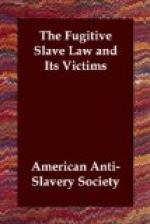“The first of these misapprehensions,” he said, “is an exaggerated sense of the actual evil of the reclamation of fugitive slaves, felt by Massachusetts and the other New England States. What produced that? The cases do not exist. There has not been a case within the knowledge of this generation, in which a man has been taken back from Massachusetts into slavery by process of law, not one.” * * * * “Not only has there been no case, so far as I can learn, of the reclamation of a slave by his master, which ended in taking him back to slavery, in this generation, but I will add, that, as far as I have been able to go back in my researches, as far as I have been able to hear and learn, in all that region there has been no one case of false claim. * * * There is no danger of any such violation being perpetrated."[A]—Webster’s Speech on the Compromise Bill, in the United States Senate, 17th of July, 1850, edition of Gideon & Co., Washington, pp. 23-25.
[Footnote A: See
also Mr. Webster’s letter to the Citizens of
Newburyport, dated May
15th, 1850, wherein he urges the same
point, with great pains
of argument.]
With such words did Mr. Webster endeavor to allay Northern alarm, and to create the impression (which was created and which prevailed extensively with his friends) that the Fugitive Law was only a concession to Southern feeling, and that few or no attempts to enforce it were likely to be made.
But when a few months had proved him a false prophet, and the Southern chase after fugitive men, women, and children had become hot and fierce, and in one or two instances the hunter had been foiled in his attempts and had lost his prey, Mr. Webster changed his tone, as follows:—
In May, 1851, at Syracuse, N.Y., he said: “Depend upon it, the Law [the Fugitive Slave Law] will be executed in its spirit and to its letter. It will be executed in all the great cities—here in Syracuse, in the midst of the next Anti-Slavery Convention, if the occasion shall arise.”
Certainly, so far as in Mr. Webster lay, so far as was in the power of Mr. Fillmore, and the officers of the United States Government generally, and of the still larger crowd of expectants of office, nothing was left undone to introduce the tactics, discipline, and customs of the Southern plantation into our Northern cities and towns, in order to enforce the Fugitive Law.
* * * * *
The remainder of this Tract will be devoted to a record, as complete as circumstances enable us to make, of the VICTIMS OF THE FUGITIVE SLAVE LAW. It is a terrible record, which the people of this country should never allow to sleep in oblivion, until the disgraceful and bloody system of Slavery is swept from our land, and with it, all Compromise Bills, all Constitutional Guarantees to Slavery, all Fugitive Slave Laws. The established and accredited newspapers




